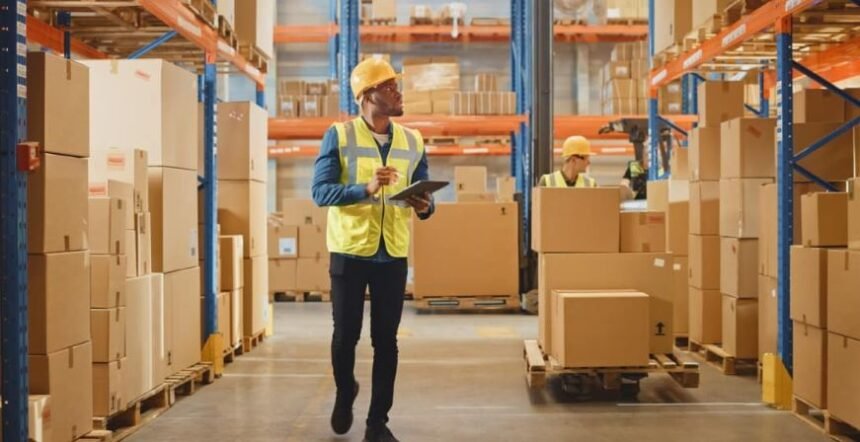This blog will demonstrate when and how to do it properly. Continue reading to find out more! Investing in an outsourced distribution warehouse is imperative to guarantee logistical success and operational effectiveness. Any business’s ability to operate depends on its 3PL distribution warehouse system. In this instance, outsourcing is a proactive move to overcome logistical obstacles and concentrate on the business’s primary tasks.
By outsourcing your distribution warehouse operations, you can leverage the expertise of professionals who specialize in optimizing storage, inventory management, and order fulfillment processes. This not only reduces overhead costs but also enhances the speed and accuracy of your distribution network. Moreover, with the right 3PL partner, you gain access to advanced technologies and scalable solutions that can adapt to your business’s evolving needs, ensuring long-term growth and competitiveness in the market.
Discover the telltale signals that now is the right moment to think about outsourcing storage in this article. This choice can enhance logistics operations, save expenses, and satisfy customers.
5 Signs That Your Company Needs an Outsourced Warehouse
Up until a few years ago, the idea of storage was frequently overstated and applied only to areas that required minimal modification. However, the difficulties facing the (dependent) transportation and storage sectors have made it clear that adequate product storage is necessary.
Adequate storage necessitates keeping commodities, raw materials, and inputs all in one place to prevent business losses. These items must also be of the same quality as soon as they are acquired.
Check out the main signs that point to the necessity of an external warehouse, which are listed below:
1. Lack of security in storage
It is crucial to have security in storage to safeguard both users and goods. Outsourcing the warehouse could be the answer for your business if security-related issues like theft, damage, or outdated equipment become a problem.
Specialist businesses, like Logicore, provide safe structures and cutting-edge methods to ensure the reliability of goods and users’ security.
2. High loss and damage values
If your firm’s loss and damage rates are excessive, it’s time to reconsider your storage plan. The outsourced warehouse provides efficient production and movement tracking and standardizes procedures.
This contributes to more effective inventory management and, ultimately, more profitability by preventing losses from damage or past-due expiration dates.
3. Lack of integration between production and supplies
Integration of supply and manufacturing is necessary to prevent product shortages or excess. An outsourced warehouse might provide effective solutions if your business needs help keeping this synchronization.
Implementing an organized system makes it easier to track product turnover and replace goods based on demand. This streamlines the production process, cuts expenses, and prevents waste.
4. Distribution and customer service failures
Specialized businesses have streamlined distribution through system and structure optimization, guaranteeing a satisfying client experience. As a result, it increases market presence and fosters customer loyalty.
5. Failures in logistics operations
Logistics operations must be effective in cutting expenses and boosting output. Warehouse outsourcing can be the answer if your organization’s logistics operations are prone to frequent breakdowns.
With staff dedicated to logistics management, outsourced businesses have fewer failures and make better use of their resources.
Selecting an outsourced warehouse can resolve the market’s ever-emerging logistical issues, promoting market competitiveness and customer happiness.
Types of outsourced warehouses
Different kinds of warehouses satisfy various operating requirements, and managers embrace the possibility of outsourcing warehouses.
The primary types of warehouses are listed below; see how these buildings can play a crucial role in logistics outsourcing.
1. Conventional warehouses
The most traditional type of storage is found in conventional warehouses. They are often made up of shelves and storage spaces and may be adjusted to fit a range of products. Businesses might outsource or build conventional warehouses to reduce expenses and boost operational effectiveness.
2. Automated warehouses
Automation has transformed logistics operations, and automated warehouses constitute the apex of this development. Modern technology and robotic systems efficiently handle product movement, collection, and storage. Businesses employ automated warehouses to benefit from the newest advancements without making infrastructure investments.
Transloading and distribution services are an essential part of the industrial process. From the point of manufacturing to the point of sale and the end user, they guarantee the integrity and food safety of the products.
By regulating temperature, limiting light exposure, and preventing impact during transportation, each item—especially the more perishable ones—lives longer, and the rate of product loss decreases.
Learn the essential steps in this article to improve the logistics of food delivery and reap significant business advantages.
Conclusion
In conclusion, optimizing your distribution networks is crucial for achieving enhanced performance and sustained business success. By implementing strategic improvements in logistics, technology integration, and inventory management, you can significantly reduce costs, improve delivery times, and boost customer satisfaction. A well-optimized distribution network not only streamlines operations but also provides a competitive edge in today’s fast-paced market, allowing your business to respond swiftly to changes and scale efficiently.
Contact us to see how we can help your supply chain run more smoothly!





